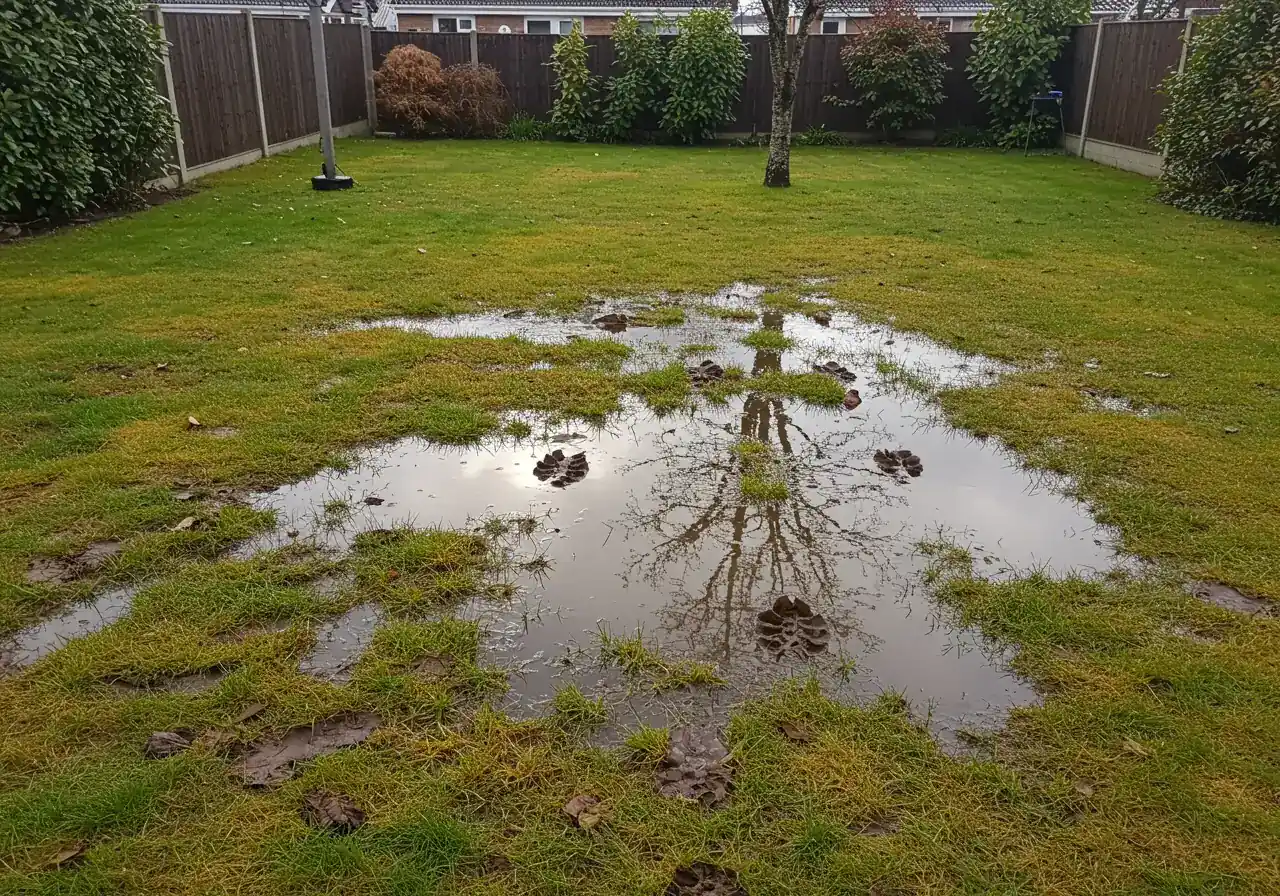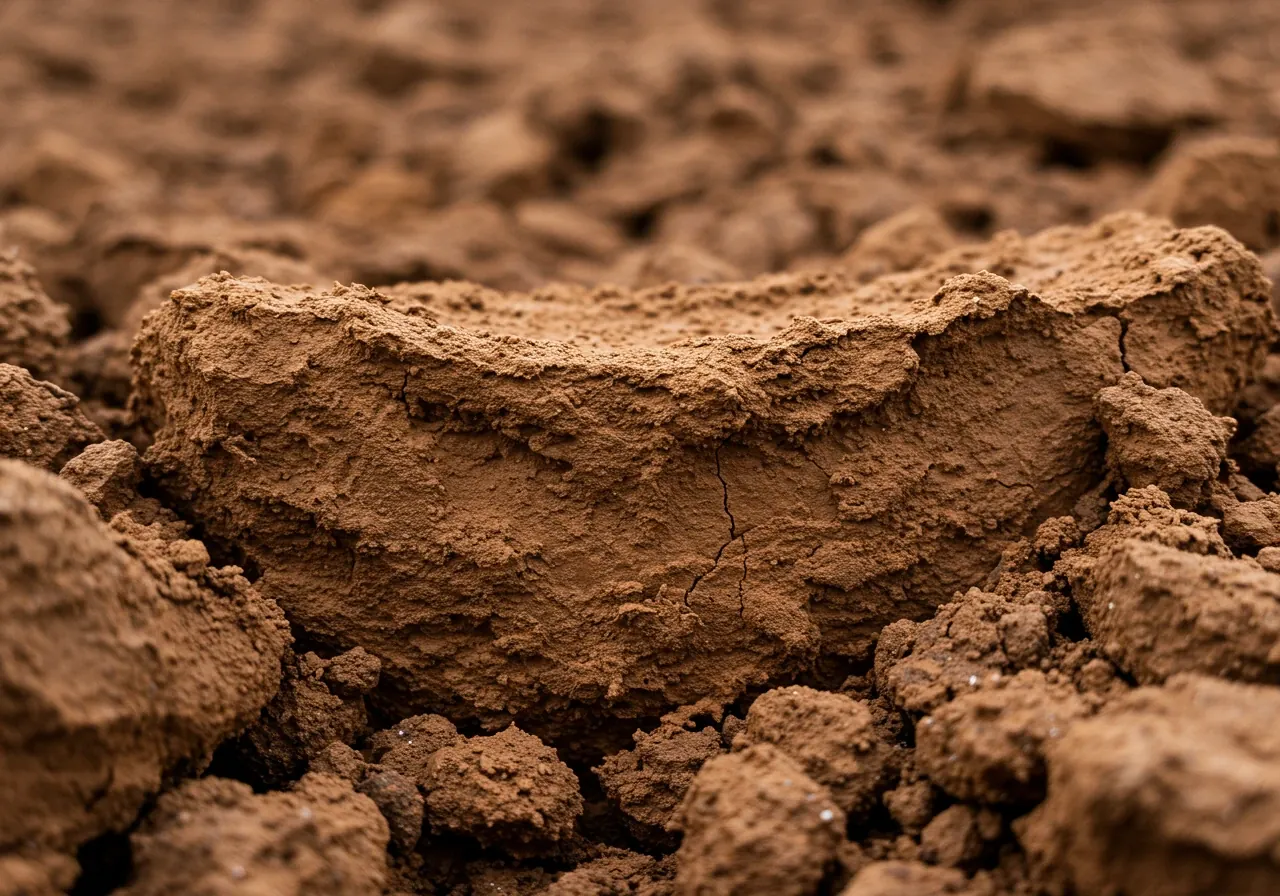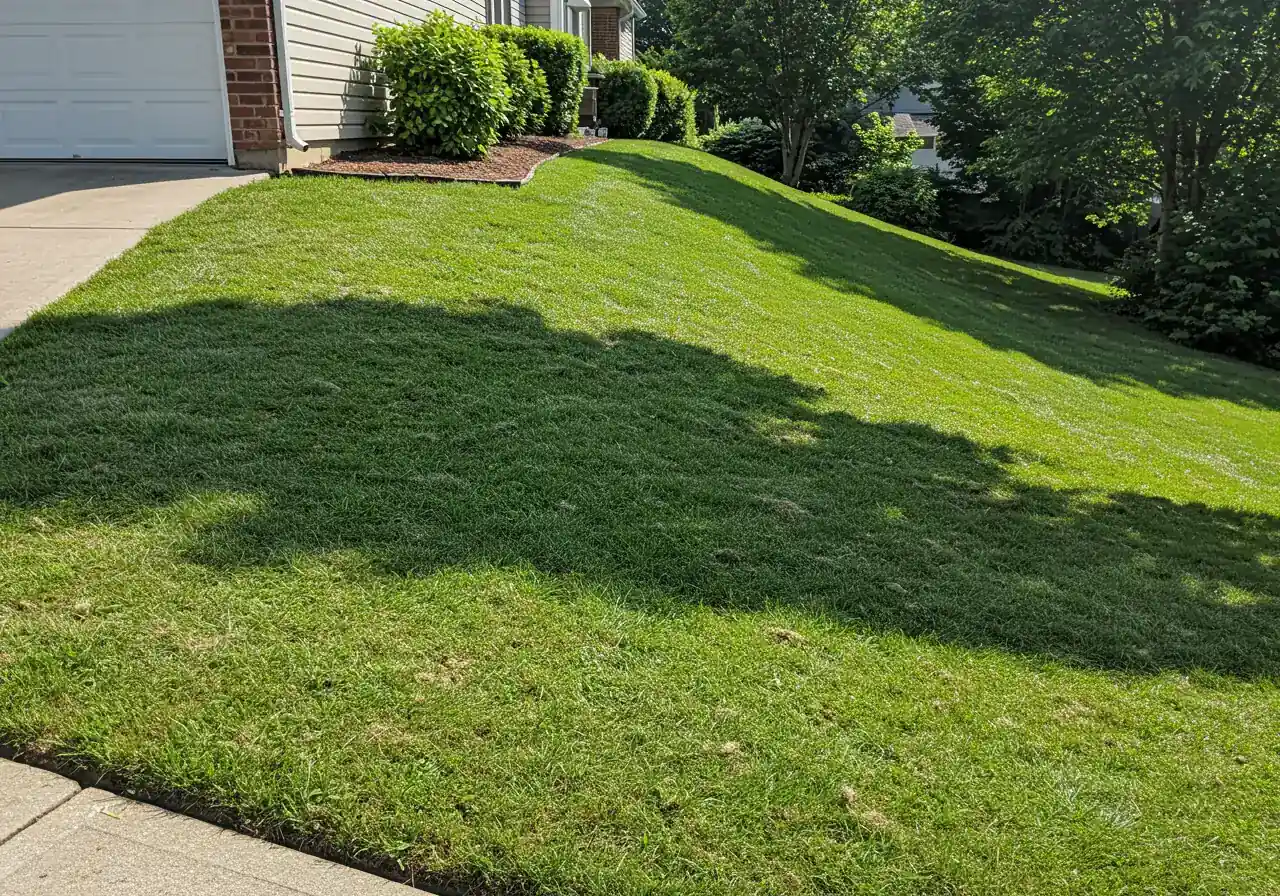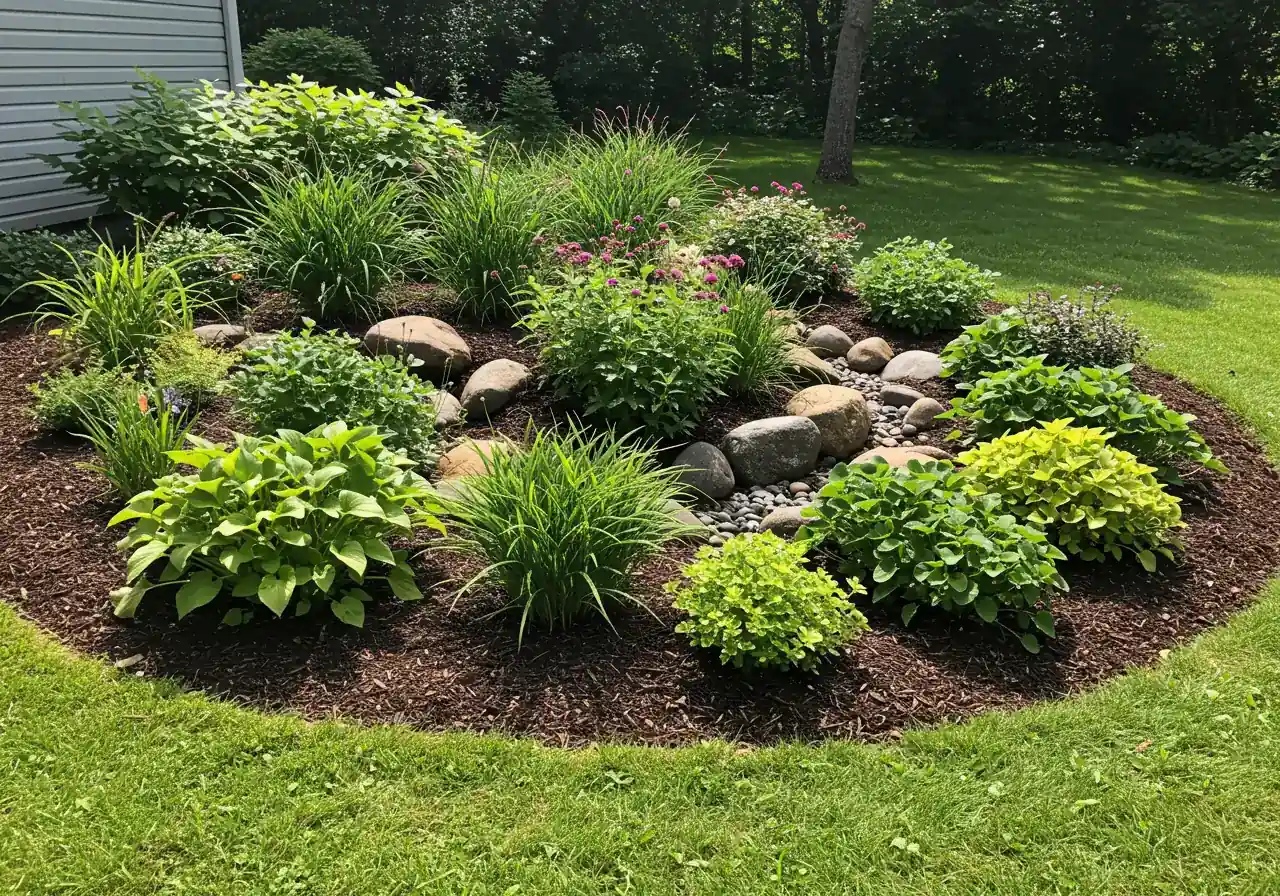Greely Spring Grading: Stop Water Damage on Clay Soil
Facing drainage issues? Protect your home!
Request a Grading QuoteQuick Guide to Greely Grading
- Why Grade? Heavy clay soil in Greely causes poor drainage, leading to soggy lawns and potential foundation damage. Grading creates slope to direct water away.
- Clay Soil Issues: Tiny particles in clay pack tightly, preventing water and air flow (poor drainage & aeration).
- Best Time: Spring is ideal for grading as drainage problems are visible and soil is more workable.
- Key Goal: Achieve a "positive slope" – ground gently sloping away from the house foundation.
- Benefits: Protects foundation, prevents water damage, improves lawn health, creates a more usable yard.
Introduction: Greely's Spring Awakening & The Soggy Lawn Blues
Ah, spring in Greely! The snow finally retreats, the birds are back, and... wait a second. Is your backyard looking less like a lush green space and more like a squishy mud pit? If you're nodding, you've likely got a case of the classic Ottawa-area "Soggy Lawn Blues." This is especially common around here, thanks to our heavy clay soil. After the big spring thaw, melting snow and rain often pool stubbornly, turning potential gardening spots into swamps and lingering dangerously close to your foundation. Neighbours from Manotick to Osgoode often face the same soggy challenge! This isn't just about messy boots; pooling water can lead to real water damage over time. Thankfully, there’s a smart landscaping solution: proper grading. Simply put, grading reshapes your land to gently guide water away from your house and critical areas. Better drainage means a healthier lawn, a protected foundation, and peace of mind for you. Let's ditch the swampy situation and get your yard ready for sunny days!

That Famous Ottawa Clay: Why Your Yard Might Feel Like a Swamp

Ever tried digging a hole in your Greely yard after a dry spell and felt like you were chipping away at concrete? Or maybe after a spring shower, your lawn in Barrhaven or Nepean turns into a mini-lake that takes forever to disappear? Yep, you’ve met the infamous Ottawa clay soil. It's practically a local celebrity, though maybe not the kind you want autographs from!
So, what's the deal with this stuff? Imagine tiny, tiny particles, way smaller than sand or silt. Clay soil is packed full of these minuscule bits. Think of it like comparing flour (clay) to sand (looser soil). When water hits flour, it gets gooey and holds the moisture, right? Sand lets water run right through. Our Ottawa clay acts a lot like that flour. The particles are so small and tightly packed together that there’s hardly any space for water or air to move through easily. This is called poor drainage and low aeration.
When it rains or the snow melts, water hits the clay and just… sits there. It can’t drain downwards quickly, leading to puddles, squishy lawns, and that swampy feeling underfoot. This compaction is a major headache for homeowners. It makes gardening tricky because plant roots struggle to push through the dense soil and can even drown if the ground stays waterlogged. It's also tough on your lawn, making it harder for grass to thrive. Thinking of putting in new grass? Check out our guide to sod installation on clay soil for specific tips. Planting larger things can also be a challenge, but we have some advice on tree planting in Greely's clay soil.
This heavy soil is also notoriously hard work! It clings to shovels when wet and turns rock-hard when dry, which can be tough on your equipment – remember the importance of keeping your Greely garden tools sharp and clean. Improving soil structure often involves amending the soil and regular maintenance, which is why fall lawn aeration is crucial for clay soils to help break up that compaction.
Clay Soil vs. Ideal Loamy Soil
| Feature | Clay Soil (Common in Greely/Ottawa) | Ideal Loamy Soil |
|---|---|---|
| Particle Size | Tiny, densely packed | Mix of sand, silt, and clay |
| Drainage | Slow / Poor | Good / Moderate |
| Aeration | Poor | Good |
| Workability | Difficult (Sticky when wet, hard when dry) | Easy |
| Water Retention | High (can lead to pooling) | Moderate (holds moisture well but drains) |
Dealing with heavy clay is a common landscaping challenge around here, but understanding it is the first step. If the swampy conditions are getting you down, exploring professional solutions might be the way to go – feel free to check out our landscaping services for help tackling that tough Ottawa clay. Find us on Google: Clean Yards.
Spring Forward: Why Now is the Perfect Time for Grading in the Ottawa Valley
Okay, let's talk timing! You've survived another Ottawa winter, complete with its impressive snow piles and the inevitable spring thaw. As everything melts, you might notice those familiar puddles forming, especially if you live in areas like Metcalfe or Richmond where that heavy clay soil loves to hold water. If you're thinking about improving your yard's drainage with grading, spring is practically shouting, "Pick me! Pick me!"
The Evidence is Clear
Melting snow and rain highlight exactly where water pools and drainage fails. Nature provides a free diagnostic!
Workable Soil Conditions
The ground is typically softer after thawing but before summer heat bakes it hard, making grading easier.
Perfect Prep for Planting
Improve drainage *before* investing in new sod, seeds, or plants (garden installation), preventing root damage.
Beat the Rush & Heat
Enjoy a better-drained yard in summer. Cooler spring weather makes the work more pleasant.
Trying to grade in other seasons isn't ideal. Summer often means rock-hard ground and stressing existing plants. Fall can work, but it's a race against frost, potentially wet conditions, and gives new plantings less time to establish before winter. Winter? Well, frozen ground pretty much says "no thanks" to digging.
Spring grading is a smart move to protect your foundation and improve your entire outdoor space. It’s often a crucial first step before other yard projects. Curious about the difference proper grading makes? Take a look at before-and-after photos in our gallery. Once the slope is right, you might want a hand getting the rest of your yard in shape; grading is often a key part of a full spring property clean-up strategy. From there, tackling garden beds is next – consider a professional garden clean-up service in Greely or even if you need a garden spruce-up further out in Marionville to complete the transformation. Explore all our landscaping and property maintenance services to see how getting the grade right fits into the bigger picture for a healthy, beautiful yard this year.
Demystifying Grading: Directing Water Away from Your Biggest Investment
Okay, let's talk about grading. It sounds technical, maybe even a little intimidating, but it's actually a straightforward landscaping concept that’s vital for protecting your home – truly your biggest investment! Think of it like gently sculpting your yard to tell water exactly where to go. Because let's be honest, water is a terrible house guest; it loves to overstay its welcome, especially near your foundation.

So, what is grading? In simple terms, it’s creating a slight slope on the surface of your lawn and garden beds, specifically directing rainwater and melting snow away from your house. Imagine a very slightly tilted countertop – spills naturally flow towards the lower edge, right? Grading does the same for your yard, using gravity as its helper.
Key Grading Terms
- Positive Slope: This is what you want! It means the ground slopes downhill and away from your house foundation. Water follows this slope, moving safely away.
- Negative Slope: This is the troublemaker. It means the ground slopes towards your house. Water pools against your foundation, potentially leading to leaks, basement dampness, cracks, and costly water damage over time. We see this issue quite a bit around Ottawa, from established areas in Nepean to newer developments.
Proper grading is the first line of defense against these water woes. When done professionally, the process usually involves assessing your current drainage patterns, determining the ideal slope (it doesn't need to be dramatic!), and then carefully moving soil. This might mean adding specific types of fill or topsoil – making the right choices is key, which is why thoughtful material selection guidance is important – or sometimes removing excess soil to achieve that gentle, positive grade. It's about precision, not just piling dirt around!
Getting the grade right often happens during a larger yard project. For instance, after establishing the correct slope, you might need a general tidying up, something covered in our comprehensive property clean-up services. Whether you're closer to the city or need assistance like our Metcalf property cleanup service or even further out with our Marionville property cleanup service, ensuring water flows away from your home is step one. We even help homeowners across the city with our Ottawa property cleanup service. Taking this step protects your foundation and sets you up for a healthier, happier lawn and garden. Thank you for taking the time to understand this crucial aspect of homeownership!
Warning Signs: Does Your Greely Property Need a Grading Makeover?
Okay, so you know grading is important for your Greely home, but how do you know if your property is actually crying out for help? Sometimes the signs are subtle, other times they're practically shouting during a downpour! Luckily, you don’t need fancy gear to play detective in your own backyard. Your eyes (and maybe your soggy boots) are your best tools. Let's look at some common clues that suggest your yard's slope might be working against you, not for you.
The most obvious red flag is pooling water, especially near your house. If your lawn looks like a paddling pool for squirrels hours (or even days!) after it rains, particularly close to the foundation, that’s a big sign. Water stubbornly sitting against your home is never a good thing. Maybe you’ve even noticed damp spots or water stains appearing inside, down in the basement or crawl space – definitely time to investigate the drainage situation outside! Persistent soggy patches in the lawn where the grass looks sad and struggles to grow are another clear indicator of poor water movement.
Keep an eye out for subtler clues too. Watch for soil washing away, creating little channels, especially near downspouts or along pathways. This erosion means water is flowing too fast and potentially in the wrong direction, taking valuable topsoil with it. You might also notice the concrete foundation wall looking more exposed than it used to, as the ground beside it settles or washes away over time. Is the mulch from your flower beds constantly ending up scattered across the lawn after a storm? Poor grading could easily be the culprit, making effective mulching and edging a frustrating, ongoing battle. It's crucial to fix the slope *before* investing time and money in major gardening projects like a beautiful new garden installation, otherwise, your hard work could literally wash away.
Checklist: Spotting Grading Issues
Do you notice any of these around your property?
- Puddles lingering near your foundation after rain?
- Consistently soggy lawn areas that rarely dry out?
- Water stains, dampness, or musty smells in the basement/crawl space?
- Visible soil erosion or mini-gullies carved by water runoff?
- Mulch or soil consistently washing out of garden beds onto paths or grass?
- A general sense that your yard slopes towards the house instead of away?
If you checked one or more, a grading assessment is recommended.
The Cost of Ignoring the Signs
Ignoring grading problems can lead to serious issues:
- Foundation Damage: Constant moisture can cause cracks, leaks, and structural weakening over time.
- Basement Flooding/Dampness: Negative slope is a primary cause of water intrusion.
- Lawn & Plant Health Decline: Waterlogged soil suffocates roots and promotes disease.
- Erosion & Soil Loss: Valuable topsoil washes away, degrading your landscape.
- Pest Problems: Standing water attracts mosquitoes and other pests.
- Reduced Property Value: Drainage issues are a red flag for potential buyers.
Addressing grading issues proactively protects your investment and prevents costly future repairs.
If you nodded along or checked off one or more items, your property might seriously benefit from a grading assessment. Ignoring these signs can unfortunately lead to bigger headaches and costly water damage repairs down the road. Sometimes these underlying drainage issues become apparent during seasonal maintenance; our teams providing Ottawa property cleanup service often spot grading concerns while working on a property. Similarly, our crews handle cleanups in Metcalf and Marionville. If you're seeing some warning signs but aren't sure how serious they are, we're happy to take a look and provide feedback. Getting professional eyes on the situation is a smart first step – check out our simple estimate feedback process to easily share your concerns and photos. Addressing grading issues is truly an investment in protecting your home and enjoying a healthier, more usable yard.
Beyond the Slope: Smart Drainage Solutions for Tough Ottawa Clay

Okay, so we've established that proper grading is the heavyweight champion when it comes to directing water away from your foundation. But let's face it, sometimes that stubborn Ottawa clay soil – whether you're in Barrhaven or Kanata – needs a little extra persuasion. Think of these next solutions as the smart sidekicks to your grading superhero, working together to tackle tricky drainage spots.
Common Drainage Solutions & Effectiveness
*Effectiveness varies greatly based on specific site conditions.
Sometimes, even with the best slope, certain areas just stay soggy. This is where things like French drains come in handy. Imagine a hidden trench with a perforated pipe, buried under gravel, that collects excess groundwater and channels it away underground. Sneaky, right?
For surface water that needs a gentler nudge, a swale might be the answer. This is basically a shallow, wide, vegetated ditch designed to slow down runoff, guide it somewhere safe (like away from your prized rose bushes!), and allow some of it to soak into the ground. It’s a more natural-looking landscaping feature.
Feeling green? Rain gardens are fantastic, eco-friendly options. These are shallow depressions planted with water-loving native plants that absolutely adore soaking up runoff from roofs or driveways. They look beautiful, support pollinators, and act like natural sponges! Keeping these specialized gardens looking their best is part of good gardening upkeep; if you need help maintaining them or other garden areas, consider professional Ottawa garden clean up services. Even specific areas known for tough clay, like around Metcalfe, can benefit immensely, and we offer targeted help such as our Metcalf garden clean up service.
And never underestimate the power of simple downspout management! Make sure your downspouts have extensions that carry water at least six feet (ideally more) away from your house. This prevents water from pooling right beside your foundation and stops it from washing away your hard work – applying effective mulching and edging techniques is much easier when water isn't constantly eroding the edges.
Remember, these solutions enhance proper grading, they don't replace it. They work as a team to combat water damage and keep your entire property healthier, which often goes hand-in-hand with regular maintenance like that offered through our Ottawa yard cleanup service. Got a particularly challenging drainage puzzle? Don't hesitate to contact us for drainage solutions – we can help figure out the best approach for your specific yard. Consulting resources like the Rideau Valley Conservation Authority (RVCA) can also provide helpful information on watershed management.
Key Insights: Greely Grading Essentials
Why is grading vital in Greely? Our heavy clay soil drains poorly, causing water pooling near foundations. Grading creates slope to direct water away.
What's the goal? To achieve a gentle "positive slope" away from the house, using gravity to prevent water accumulation and potential damage.
When is the best time? Spring is ideal – drainage issues are visible, and the soil is more workable than in summer or winter.
Is grading the only fix? It's the primary solution, but French drains, swales, rain gardens, or downspout extensions can provide extra help for stubborn spots.
What happens after grading? The area usually needs restoration like adding topsoil and seeding/sodding (soil preparation is key). Ongoing garden maintenance protects your investment.
How is my information handled? We respect your privacy. Details provided for estimates are used solely for that purpose. See our full privacy policy for details.
Greely & Ottawa Grading FAQs: Your Questions Answered
Got questions about getting your Greely yard graded? You're not alone! It's a common landscaping project around Ottawa, especially with our famous clay soil. We hear lots of the same queries, so let's tackle some of the most frequent ones head-on.
Ah, the million-dollar question (hopefully not literally!). The cost really depends on a few things: the size of your yard, how complex the existing slope issues are, how easy it is to get equipment into the area, and whether we need to bring in extra soil (fill) or haul some away. Think of it like baking – a simple cupcake costs less than a fancy three-tiered cake! Because every yard is unique, the best way to get a clear picture is with a personalized quote. We're happy to take a look and give you a detailed breakdown – you can easily request a free estimate online.
Usually, for straightforward residential grading on your own property simply to improve drainage away from your foundation, you likely won't need a permit. However, if the project is very large, involves major changes to the landscape, or is near a waterway, ravine, or environmentally sensitive area, a permit might be required. It's always safest to double-check the City of Ottawa's rules or ask your contractor. We can help guide you on this!
Grading is often a huge step in the right direction for reducing basement dampness! By ensuring water flows away from your foundation, you significantly reduce the pressure and amount of water soaking the ground right next to your basement walls. It's usually the most important first step. While it can make a massive difference (check out some amazing yard transformations grading helped achieve), severe dampness might sometimes need a combined approach, potentially involving things like foundation sealing or improving interior drainage. But fixing the exterior slope is absolutely key to tackling moisture issues.
Not forever, we promise! For an average-sized residential yard in Greely or nearby areas, the actual grading work often takes just a few days, depending on the weather (working soggy clay is no fun for anyone!) and the specifics of the job. Larger or more complex projects might take a bit longer. We always aim to work efficiently and minimize disruption so you can get back to enjoying your improved yard space sooner rather than later. Access to client information is managed through our customer portal.
We totally understand wanting to protect your green babies! Some disruption to the lawn in the immediate work area is usually unavoidable when reshaping the soil. However, professional landscaping teams work carefully to minimize the impact. We protect surrounding areas and plan the work thoughtfully. Afterwards, the graded areas will need restoration, typically involving adding topsoil and either seeding or laying new grass. Many homeowners opt for fresh turf for quick results – we offer expert sod installation services to make your lawn look great again fast. The process might also involve some general tidying after the heavy equipment leaves; think of it like needing a quick sweep after renovations, similar to how our Metcalf yard cleanup service helps folks tidy their properties. The short-term disruption leads to long-term benefits for your entire yard, including healthier gardening conditions! Proper lawn care afterwards is also essential.
You bet! "Cut and fill" sounds fancy, but it just means moving soil around. We "cut" (remove) soil from high spots and "fill" (add) soil to low spots to create that ideal, gentle slope. It's like leveling a cake batter in the pan. "Compaction" refers to how tightly packed the soil particles are. Our Ottawa clay is naturally prone to compaction, which hinders drainage. While some compaction is needed after grading to ensure stability, over-compaction is bad. We aim for the right balance so water can still move through the soil appropriately, preventing future water damage and supporting a healthy lawn. Learn more about us and our approach. Our work follows standard terms and conditions.
Conclusion: Protect Your Greely Home This Spring (and Beyond!)
So, let's put a bow on this! Living in Greely, or just about anywhere around Ottawa like Manotick, means springtime often brings the "joy" of soggy yards, thanks to our special clay soil. We've dug into why poor drainage isn't just messy—it can threaten your lawn, spoil your gardening plans, and even cause costly water damage to your home's foundation. The good news? Fixing your yard's slope with professional grading this spring is a fantastic landscaping solution. It guides water away, protects your home, and gives you a healthier, more usable outdoor space.
Don't wait for the puddles to become permanent fixtures! If you're tired of soggy boots and worried about your foundation, it's time for a chat. Ready to reclaim your yard and improve your drainage?
We're happy to provide a friendly consultation and explore how grading can benefit your Greely property.
Get a Free Grading Estimate Explore All Our ServicesVisit our website or call us to get started – let’s get your yard ready for sunny days ahead! Proper site preparation is crucial, learn more about our soil preparation process.

